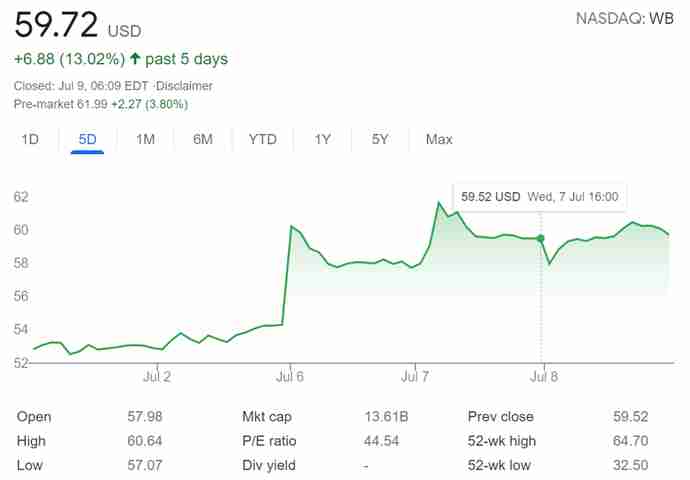 The logo of Weibo
The logo of Weibo
Asian Tech Press -- Rumors say Weibo Corp. (NASDAQ: WB), China's Twitter-like platform, its privatization could pave the way for the exit of its second-largest shareholder Alibaba Group Holding Ltd (BABA: NYSE).
According to a Reuters report on July 6, Weibo chairman Charles Chao and a state investor are talking to take the company private at $90-100 per share, facilitating the exit of the major shareholder Alibaba and allowing Weibo to eventually relist in China to capitalize on higher valuations.
Later that day, Weibo announced that the news was false, saying that Chao had informed the company that he had not discussed its privatization with anyone. Even so, the market has already expressed its bullishness on the privatization with the stock price.
 Weibo stock over 5 trading days
Weibo stock over 5 trading days
Before Weibo’s official denial, its shares were up nearly 50% for a while in pre-market trading. As of the close of trading on July 7, Weibo shares were at $59.52, up 14.22% from before the privatization rumors.
1. Long-rumored Privatization
Weibo went public in the U.S. in April 2014, making it the first Chinese social media stock on Nasdaq. Before entering the capital market, it grabbed users from rivals like Tencent Weibo and Sohu Weibo, becoming the Twitter-like product with the largest number of users in China.
The social platform is planning a secondary listing in Hong Kong as soon as this year, according to Bloomberg this February, citing people familiar with the matter. Recently, the possibility of its privatization has been put on the table again.
After Sina Corp, Weibo's parent company, delisted and went private in March this year, there was news in early June that Weibo would also be privatized and delisted, and that it might be listed as one of A shares in the shell of Youzu Interactive Co Ltd (002174: Shenzhen). However, the news was not confirmed by Weibo.
It is worth noting that at the end of June, an investor asked Youzu a question on the interactive platform, asking whether there was a disclosure plan for the news that it received financing from Sina on June 10. In this regard, Youzu said that there is no undisclosed information that should be disclosed.
In fact, with the trend of overseas-listed Chinese stocks returning to Hong Kong for going public, many companies have already made their secondary listings. While Weibo seems to be half a beat slower. Considering that Chao had previously pushed Sina to go private, it is not unlikely that Weibo will follow the same path this time with his help.
2. A Part of Alibaba's Media Assets
Public information shows that Sina is currently the top shareholder of Weibo, with a 44.67% stake. while Alibaba, the second-largest shareholder, holds 29.79%.
As reported by the Wall Street Journal in March, Alibaba has been disposing of its media assets since its fintech unit Ant Group IPO failed. Predictably, for Weibo, it still needs to find another major shareholder now to prepare for Alibaba's exit.
Alibaba, founded by billionaire Jack Ma, has built a great media empire through investments and partnerships covering newspapers, magazines, websites, video, TV, new media, and emerging social media.
The most notable part in Jack Ma's formidable media holdings, in addition to the South China Morning Post, Hong Kong's long-established English-language newspaper acquired for $266 million in 2015, is Weibo, China's largest and most popular social media platform.
3. Concerns about Alibaba's Media Empire
Ordinary people began to realize the pervasiveness of Alibaba's vast media empire in April 2020, when the wife of Jiang Fan, president of the company’s marketplaces Taobao and Tmall, pointed out on Weibo that he had an extramarital affair with Zhang Dayi, a social media influencer who is a co-founder of Alibaba-backed KOL agency Ruhnn Holding Ltd.
Jiang's alleged affair quickly festered. However, in less than an hour, some Weibo users found that their related posts were deleted. After that, all the related topics disappeared. Jiang's wife's Weibo account was blocked. Various media and Weibo marketing accounts kept silent.
In May of the same year, an internal memo mentioned the matter, claiming that Alibaba had authorized Weibo to take relevant actions and "use capital to manipulate public opinion. "
The head of Sina was interviewed by Chinese regulators in June 2020, who ordered Weibo to rectify issues such as interference with the online communication landscape and violations of the law in Jiang's case.
At the 2020 China New Media Conference in November 2020, Xu Lin, vice minister in China’s central propaganda department and director of the State Council Information Office, said in a heartfelt voice, "We must firmly seize the initiative and dominance of news and public opinion work, resolutely prevent diluting the Party's leadership in the name of integrated development, and strongly guard against the risk of capital manipulating public opinion."
The Wall Street Journal reported in March 2021, citing knowledgeable sources, that Chinese regulators had reviewed Alibaba's list of media assets and were alarmed by Alibaba's media prowess, and asked it to come up with a plan to significantly reduce its media holdings. Meanwhile, all plans proposed by Alibaba need to be approved by senior state leaders.
4. A Hot Potato in Alibaba
As an important social media platform in China, Weibo has become increasingly influential in shaping public opinion, especially in the case of Jiang.
Amid the clamor for "not letting capital manipulate public opinion", Weibo has apparently become a hot potato in Alibaba's hands.
As a result, Alibaba may have been tempted to withdraw from Weibo's shareholder list as the state steps up its crackdown on capital. The privatization of Weibo would pave the way for its withdrawal.
After all, a large share of Weibo, which has a strong influence on public opinion in China, is in the hands of a powerful capital player, which is not allowed by Chinese regulators. Alibaba's exit from Weibo has become inevitable as part of the tech giant's plan to shed its media holdings.
5. A Way out for Weibo
There's no confirmed news yet on whether Chao will take Weibo private. But judging from Sina's previous privatization efforts and the problems Weibo is now facing, it seems that privatization is highly probable.
For Weibo, privatization is an opportunity to reposition its equity and revalue its market value. If a state-owned investment is brought in, as Reuters reported, it may be more beneficial to Weibo's platform security and business development.
Of course, a U.S.-listed Weibo would also face pressure to be "politically correct" amid tighter regulation of foreign-listed Chinese stocks.
On July 6, China's two highest-level offices, the General Office of the Central Committee of the Chinese Communist Party (the Central Office) and the General Office of the State Council issued a document, requesting to strengthen the regulation of overseas-listed Chinese stocks and improve the system of extraterritorial application of capital market laws. Earlier, the U.S. Public Company Accounting Oversight Board (PCAOB) was working on a cross-border regulatory approach mainly for Chinese companies.
"If privatized, the move is not complicated and is purely from a business perspective," said a senior investor, "Weibo's user growth is under pressure amid the onslaught of short-form video and other social platforms, which has reduced investor confidence.
He added, "If Weibo goes private, the company is injected with the state capital, which might allow it to have more funds for business attempts. "
So, privatization should be a worthwhile option for Weibo for now. When Chinese stocks are at a low ebb, it is not surprising that the market is buzzing with news of taking Weibo private. While Weibo has denied the rumors, its future does bear pondering. To go or not to go private? Does Chao have other plans?
It's possible, therefore, that the rumor, which was debunked by Weibo, is not just an empty one, but that things are just starting to get out of hand. Whether it will go private or not will probably depend on the subsequent development.





